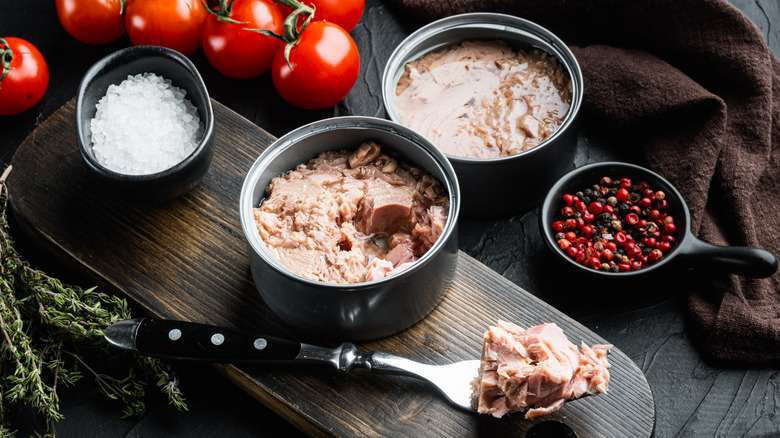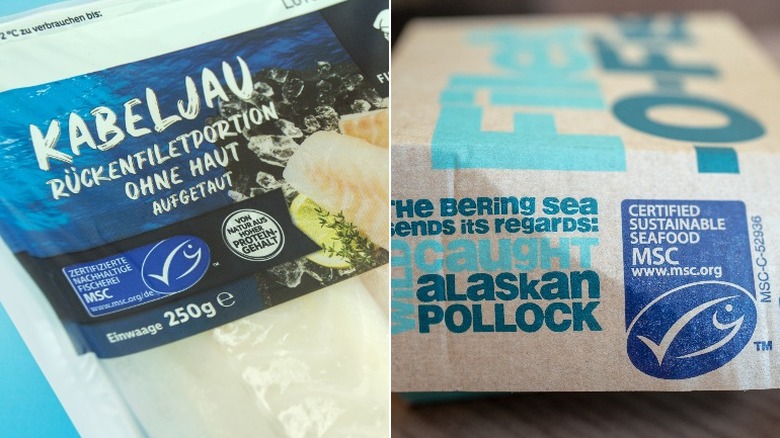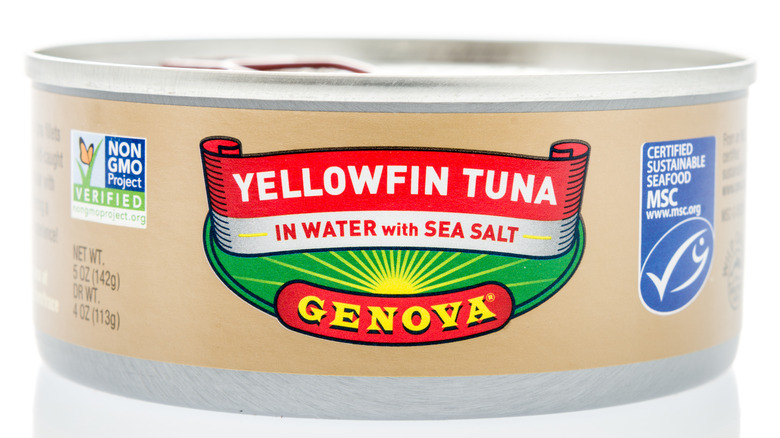The One Thing To Look For When Buying Canned Tuna
For seafood lovers, buying canned tuna can be confusing. You have your heart set on making a magnificent tuna salad, but when searching the shelves for the hero of the dish, you notice the labels all have variations regarding what the product is, including how it's packed and from where the fish was sourced.
If you don't understand the significance behind all those labels, you may resign yourself to throwing any canned tuna in your cart that simply has an appealing design — but you shouldn't give up so soon. The description on the can contributes valuable information and may impact your decision on which brand to purchase.
Labels like white, light, and chunk light are easy enough to identify and convey what subspecies it contains and whether it has smaller chunks of tuna or a filet. The difference between oil-packed and water-packed is self-explanatory, but it can help you determine which would be better for your dish, as oil-packed chicken of the sea will come out of the can with more flavor. However, the most important markers on the package signify where it was caught and how.
Specific terms to look for include pole-caught, pole-and-line-caught, troll-caught, FAD-free, free school, and school-caught. You also want to look for a little blue fish logo on the can, which indicates the tuna is MSC (Marine Stewardship Council) certified. Though many companies are sourcing their tuna more carefully these days, not all are, and the labeling on the tin is sometimes unclear.
Mislabeling canned tuna is an ongoing issue
The USDA requires fish producers in the U.S. label products with their country of origin and method of production, but not every company complies. In a 2016 report by Oceana, researchers discovered that up to one out of five seafood samples they tested were incorrectly classified. The reason this is problematic is that tuna caught in some locations, according to NPR, test higher for pollutants — like pesticides, flame retardants, and polychlorinated biphenyls — than fish sourced from other areas.
It's not just health concerns that make correct labeling important. For decades, commercial fisheries have run afoul of environmentally-minded organizations for their amount of bycatch – other marine life caught along with the tuna. In the 1990s, consumers began seeing "dolphin-safe" characterizations on some brands that signified there was minimal bycatch during collection, but today, there are more specific terms for those searching for sustainably sourced canned tuna.
Products labeled pole-and-line-caught, or troll-caught are telling you that the fish were hand-pulled from the line, which incurs little bycatch. FAD-free, free school, and school-caught labels indicate no FADs (fish aggregating devices) were used to lure the fish toward large walls of netting, which also causes less harm to neighboring marine animals. An MSC certification attached to the packaging lets consumers know that the producers source fish from healthy stocks and have minimal environmental impact.
Best canned tuna to buy and where
Many canned tuna producers nowadays market their products to illustrate they are responsibly sourcing their catch. They label their goods with not only the country of origin but the method by which the fish were taken and an MSC certification as well. This is valuable to consumers because testing has been conducted on tuna worldwide to determine toxicity levels in the fish, and some locations fared better than others. After being tested in a dozen locations worldwide for pollutants and mercury, researchers discovered that less populated areas such as the West Pacific Ocean had tuna that tested 36 times lower for pollutants than more commercially active areas like Europe and North America, according to the reporting from NPR.
Some brands with an MSC certification on their packaging include Ocean Naturals, Safe Catch, American Tuna, and Wild Planet. Grocers such as Whole Foods have committed to only selling seafood that meets specific sustainability standards, and MOM's Organic Market also has policies dictating that all its canned tuna is safely and sustainably collected.
Some other stores like Aldi have partnered with FishWise — a company dedicated to addressing the environmental and human resource challenges that influence fishing sustainability — to improve their sourcing methods. When buying canned tuna, look for the little blue fish indicating it is MSC certified, then see if there is more detailed information about how and where it was caught to get the best product — for you and for the ocean.


